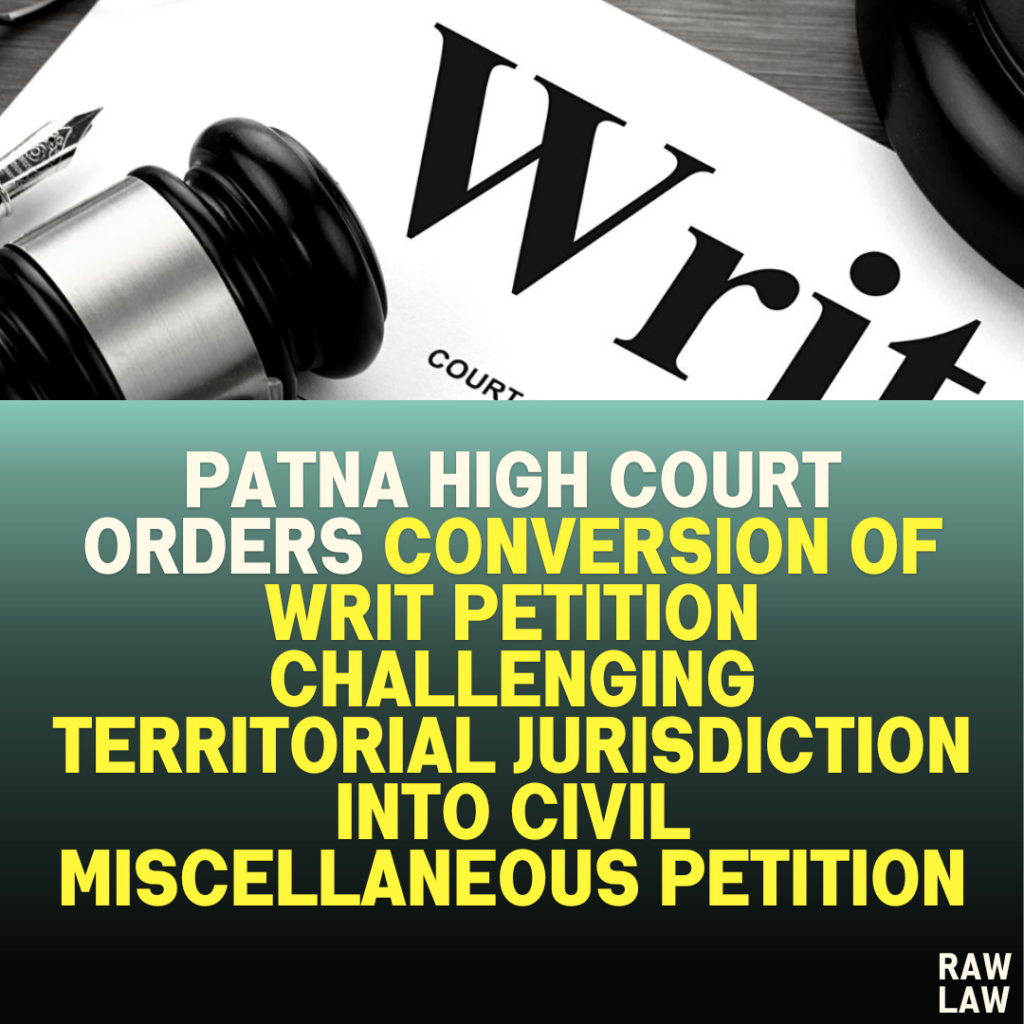Court’s Decision:
The Patna High Court directed the petitioner to convert the current writ petition into a Civil Miscellaneous Petition, as writ petitions under Article 226 of the Constitution are not maintainable against judicial orders of civil courts. The Court noted that jurisdiction under Article 227 is distinct from jurisdiction under Article 226, emphasizing that the issue should be heard as a Civil Miscellaneous matter.
Facts:
The petitioners filed a writ application challenging an order dated 28.01.2016 passed by the Learned Principal Judge, Family Court, Madhubani, in Guardianship Case No.1/14. The said order pertained to a guardianship and custody case concerning the minor son of the respondent, which was brought under Section 6 of the Hindu Minority and Guardianship Act and Section 7(g) of the Family Court Act. The petitioners sought the disposal of their application challenging the territorial jurisdiction of the Court, arguing that the proceedings were initiated in an incorrect forum and requested the issue of jurisdiction to be determined as a preliminary matter.
Issues:
The main issue before the Court was whether the writ petition filed under Article 226 challenging the territorial jurisdiction of a civil court could be sustained, or if it should be pursued as a Civil Miscellaneous Petition under Article 227.
Petitioner’s Arguments:
The petitioners argued that the territorial jurisdiction of the Family Court, Madhubani, was incorrectly assumed in the guardianship case, and the petitioners’ challenge to the maintainability of the proceedings should have been decided as a preliminary issue. They submitted that the lower court’s decision to defer the jurisdictional challenge was erroneous, and the proceedings should be stayed.
Respondent’s Arguments:
The respondent contended that the matter involved mixed questions of fact and law and could not be decided as a preliminary issue. They further pointed out that the court below was within its rights to defer the question of jurisdiction until all facts were thoroughly examined.
Analysis of the Law:
The High Court, referring to the Supreme Court’s decision in Radhey Shyam and Another v. Chhabi Nath and Others, 2015 (5) SCC 423, held that judicial orders of civil courts are not amenable to writ jurisdiction under Article 226 of the Constitution of India. Instead, the appropriate remedy lies under Article 227. The Court distinguished the scope of Articles 226 and 227, noting that while Article 226 covers writs against orders of tribunals or authorities, Article 227 is meant to supervise judicial orders of civil courts.
Precedent Analysis:
The Court relied on the judgment of Radhey Shyam and similar precedents, including Surya Dev Rai v. Ram Chander Rai, (2003) 6 SCC 675, which was subsequently overruled on the question of maintainability. The High Court reaffirmed that any petition challenging a judicial order of a civil court must be filed as a Civil Miscellaneous Petition under Article 227.
Court’s Reasoning:
The High Court observed that since the petition sought to challenge a judicial order of a civil court on the question of territorial jurisdiction, it could not be entertained under Article 226. Instead, the appropriate recourse was to convert it into a Civil Miscellaneous Petition. The Court reasoned that the maintainability of the petition under Article 227 would provide the petitioners with the necessary relief without violating the jurisdictional principles laid down by the Supreme Court.
Conclusion:
The High Court directed the petitioners to convert the writ petition into a Civil Miscellaneous Petition within four weeks. The Registry was instructed to provide all necessary assistance for this conversion and prioritize the listing of the case before the appropriate Bench due to the long pendency of the matter.
Implications:
The judgment reaffirms the distinction between Articles 226 and 227 in challenging civil court orders. This decision clarifies that writ petitions against judicial orders of civil courts should be pursued under Article 227, thereby preventing misuse of Article 226 in matters that fall squarely within the supervisory jurisdiction of High Courts.




Pingback: Jharkhand High Court Confirms Life Sentence for Murder: Court Finds Attack with Axe After Argument to Be Deliberate and Intentional - Raw Law
Pingback: Delhi High Court Quashes Reassessment Notice Due to Mechanical Approval Under Section 151 of the Income Tax Act: "Mere Endorsement of ‘Yes, I am Satisfied’ is Insufficient, Reflects Lack of Independent Application of Mind" - Raw Law